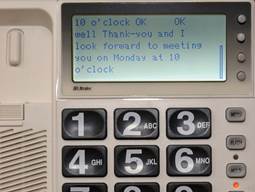NTID Co-op and Career Center – Employers
- RIT/
- National Technical Institute for the Deaf/
- Experiential Learning/
- NCCC - Employers
Hiring RIT/NTID deaf and hard-of-hearing co-op students and graduates can give your businesses a competitive advantage by bringing today's high-tech skills and diversity to the workplace.
NCCC Services
Hiring RIT/NTID deaf and hard-of-hearing co-op students and graduates can give your businesses a competitive advantage by bringing today's high-tech skills and diversity to the workplace. Our employment specialists have the experience and skills to assist you with your employment needs.
Get tips for interviewing and working with a deaf or hard-of-hearing person, including common workplace accommodations. Find out about the rigorous academic programs that prepare students with state-of-the art skills. Post a job on our job search page. Curious about RIT’s nationally recognized co-op program and what that means for you and your student hire? Interested in workshops that will help your company integrate deaf employees into the workforce?
It's easier than you think!
The NTID Co-op and Career Center (NCCC) is ready to work with you before, during, and after the hire of a deaf or hard-of-hearing person. It's easier than you think.
Our co-op students and graduates possess the skills necessary to effectively do the job and are trained in state-of-the-art processes on the latest equipment in high demand technical fields.
Take a minute and view our video titled I Can Work for You. It showcases some of our satisfied employers and successful graduates, a wonderful combination.
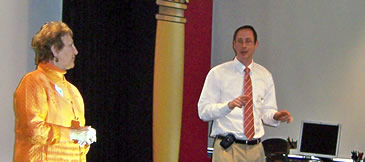
Working Together: Deaf and Hearing People is an interactive, experiential workshop that fosters the sensitivity and skills for deaf, hard-of-hearing and hearing colleagues to work together successfully, leading to increased productivity for all. This workshop is for supervisors and co-workers, human resources personnel, and equal employment opportunity and affirmative action professionals and will cover these topics:
- Understanding Hearing Loss and Deaf Employees
- Communication on the Job
- Approaches to Empower and Support Deaf and Hard-of-Hearing Employees in the Workplace
- Providing Support and Resources for Deaf and Hard-of-Hearing Employees
Request a Workshop
To inquire about workshops, or tailoring training to your organization's needs, contact the NTID Co-op and Career Center at (585)-286-4155 (V/VP).
Academic Majors
Hundreds of students from all over the U.S. and other countries specialize in programs that graduate highly skilled hands-on technicians who can hit the ground running in your organization. Select the NTID's Associate Degree Programs listed below to view more information. No matter where your business is located, NTID can help you find skilled people at the technician level.
- 3D Graphics Technology
- Accounting Technology
- Administrative Support Technology
- Architectural and Civil Drafting Technology
- Applied Computer Technology
- Design and Imaging Technology
- Laboratory Science Technology
- Mobile Applications Development
- Precision Manufacturing Technology
To find qualified applicants to meet your hiring needs:
Hundreds of deaf and hard-of-hearing students study in various other colleges of RIT. Click here for program and salary information.
To find qualified applicants to meet your hiring needs:
Career Fairs / Events
The NTID Career Fair
The NTID Co-op and Career Center extends their gratitude to all of the employers that participated in the 2024 NTID Career Fair. We appreciate our employer partners for their dedication to our students’ and graduates’ success!
For information about the career fair and the benefits of hiring RIT/NTID students and graduates, learn more here.
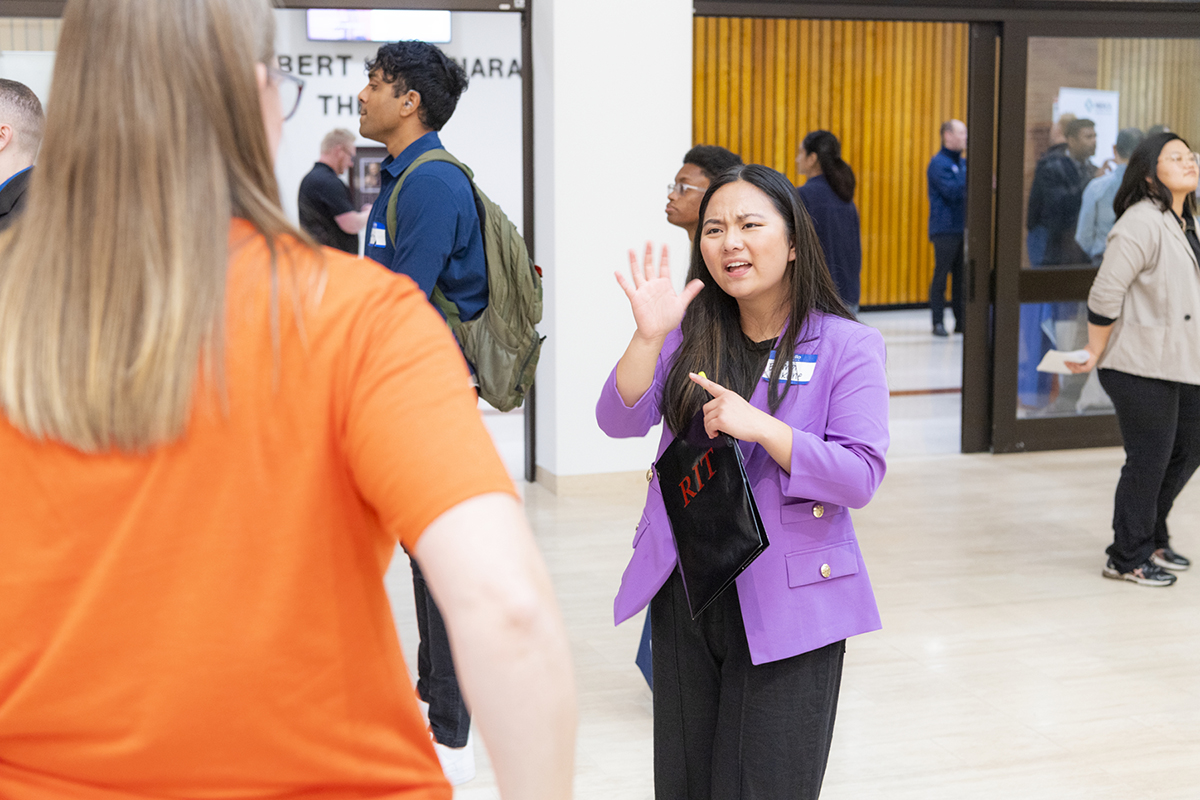
The 2025 NTID Career Fair time and date will be announced in the late spring.
If you would like to be added to the NTID Career Fair Interest list, contact ntidcoe@rit.edu. Companies on the list will receive notice when event registration opens in late spring. The NTID Career Fair Team will evaluate employer interest, giving priority to companies that hire for both co-op/internships and full-time positions, as well as those that recruit from a variety of majors.
For more information or general questions, contact ntidcoe@rit.edu.
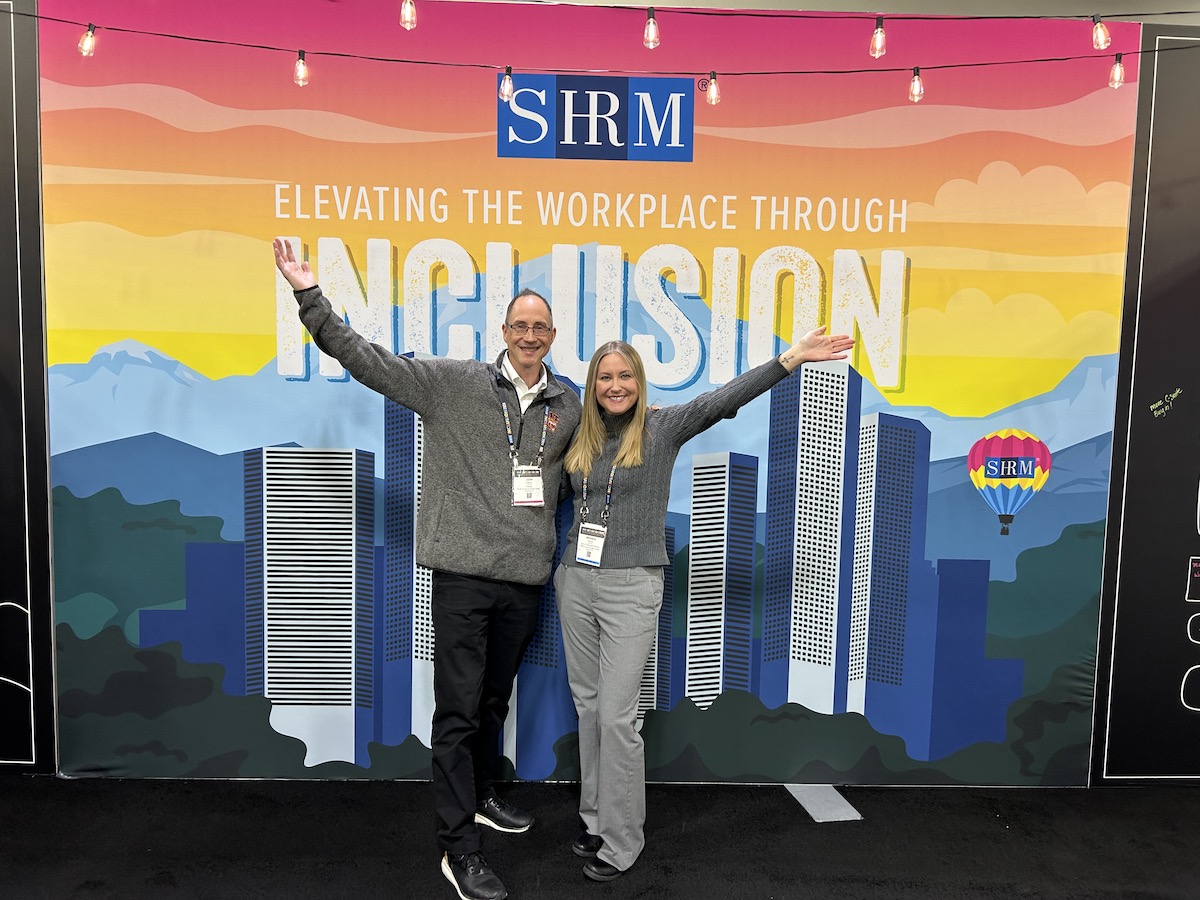
NCCC is on the road!
NCCC staff travel nationwide to network, make presentations and exhibit at venues where employers gather, in order to develop employment opportunities for co-ops for students and jobs for graduates.
We welcome information about conferences or exhibiting opportunities where NCCC staff could speak on behalf of well-qualified, highly trained deaf and hard-of-hearing students and graduates and the diversity they bring to the workplace. If you know of such opportunities, please contact NCCC.
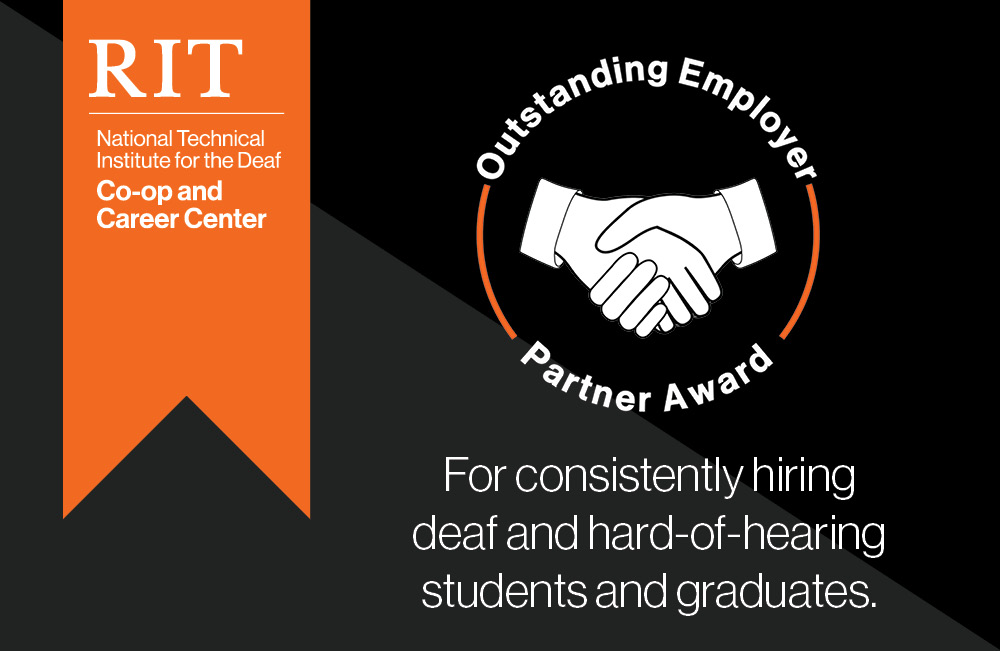
This annual award recognizes employers who have a sustained record of hiring RIT/NTID deaf and hard-of-hearing co-op students and graduates. The award is presented each fall during the NTID Career Fair. Learn more about the 2024 Outstanding Employer Partners.
Winners of Outstanding Employer Partner Award
2024:
Dow Chemical Company
Procter & Gamble
2023:
United States Bureau of Reclamation
MWI, Inc.
Fidelity Investments
2022:
PNC Financial Services
University of Tennessee – Knoxville
2019:
Rochester School for the Deaf
Tobyhanna Army Depot
2018:
Eastman Kodak
Prudential Financial
Route 66 Promotions
The Learning Center for the Deaf
2017:
GE Aviation
Tufts University
2016:
OhioHealth
Solar Turbines
2015:
The Gleason Works
University of California-San Diego (Moores Cancer Center)
Purple Communications
2014:
Federal Deposit Insurance Corporation
Aspen Camp of the Deaf and Hard-of-Hearing
2013:
Dow Chemical Company, Midland, Michigan
University of Michigan-Kresge Hearing Research Institute, Ann Arbor, Michigan
ZVRS, Clearwater, Florida
2012:
Sorenson Communications, Salt Lake City, Utah
City of Los Angeles, Los Angeles, California
Bender Consulting Services, Pittsburgh, Pennsylvania
2011:
American School for the Deaf, West Hartford, Connecticut
IBM, Austin, Texas
Crane Group of Companies, Columbus, Ohio
2010:
Defense Finance & Accounting Service, Rome, New York
BNY Mellon, Pittsburgh, Pennsylvania
Hiring a Student or Graduate
NTID co-op and graduate students are well trained, highly skilled candidates who are ready to work. To learn more about our co-op program and graduates, please expand the sections below.
Over 600 students specialize in programs to become hands-on technicians. No matter where you are located, you can look to NTID to fill a need for hard-to-find skilled people at this level.
Some 350 students pursue Bachelor's and Master's degrees to enter a variety of professions, and possess the skills to effectively do the job in high-demand technical fields.
You can join the ranks of top-performing employers who have found that their competitive advantage is advanced by the diversity of their organizations.
The NTID Co-op and Career Center is a resource for businesses and industries wishing to hire deaf and hard-of-hearing people. The center provides workshops to foster successful work relationships, access to a personnel pool that matches staffing needs, consultations and materials regarding accommodations, and visits to co-op employers.
Hiring an RIT/NTID student for a co-op has many benefits for your organization. Learn more about taking advantage of co-op opportunities.
How can I hire a deaf or hard-of-hearing student?
It's easy. All you need to do is request candidates and tell us about your staffing needs.
Your organization can benefit from hiring an RIT/NTID graduate in the following ways:
- Deaf and hard-of-hearing graduates are well-trained and have the skills to hit the ground running.
- They possess skills in state-of-the-art processes on the latest equipment.
- They have experience in the world of work through RIT's co-op program.
- They understand the concepts of business bottomline, quality focus, teamwork, perseverance to get the job done.
- They have learned strategies to facilitate communication and successful interactions between deaf and hearing people.
If you want a skilled and highly motivated employee, hire a deaf or hard-of-hearing graduate here.
Interviewing a Deaf Person
- When setting up the interview, ask the candidate how they will prefer to communicate during the interview.
- Inform the receptionist that you are expecting a deaf or hard-of-hearing candidate.
- Find a location with good lighting.
- Have a written itinerary and company literature available.
- Make sure your internet connection is working properly and you are able to join the career fair link
- Find a quiet spot with no distractions to sit during the event and make sure you have a plain background behind you.
- Test your camera to make sure it is working properly and that there is good lighting.
- Use good posture when sitting or standing during the event.
- Provide a written copy of the interview questions.
- Speak clearly and slowly.
- Use gestures and facial expressions.
- Maintain eye contact by looking directly at the person.
- Encourage the deaf or hard-of-hearing individual to let you know if your communication is unclear.
- Rephrase things if necessary.
- Ask open-ended questions.
- Use paper and pencil if necessary.
- Ask the candidate to demonstrate his or her skills during the interview by operating a piece of equipment or software application, etc.
- Resist putting your hands on or near your mouth as you speak.
- Position the interpreter next to the interviewer so the candidate can easily see both individuals.
- Clarify whether the candidate will speak for themselves, or whether the interpreter will voice what the candidate signs.
- Make eye contact with the candidate.
- Address your questions directly to the candidate, not the interpreter.
Deaf and hard-of-hearing people can use the phone through a variety of technologies. These technologies are available to you at no cost and are easy to use. All you need is your phone, mobile device, or teleconference capability.
We recommend that you first email the candidate to schedule a time for the phone interview. You may want to consider letting the applicant call you for the actual interview so they can select the telecommunications technology that works best for them. In this way your interview experience will go as smoothly as possible.
For questions, contact us.
Working With a Deaf Employee
Consider these strategies to help create mutually beneficial work relationships between deaf and hearing employees.
Pre-Employment
- Ensure upper-level management support.
- Clarify job requirements and job descriptions.
- Provide organizational literature for review before the interview.
- Provide a written itinerary if more than one person is interviewing.
- Inform your receptionist or secretary that you are expecting a deaf applicant.
- Prepare co-workers by reviewing communication strategies.
- Discuss with managers and supervisors the best ways to facilitate integration.
- Ask deaf employees about their communication preferences (sign or voicing).
- Retain an interpreter, if necessary.
New Employee Orientation
- Provide name tags, including job titles, for everyone.
- Hire an interpreter for the first day, if necessary.
- Provide an organizational chart.
- Give deaf or hard-of-hearing employees information to read before the benefits meeting.
- Use captioned films or videotapes, if available, that explain benefits, or refer new hires to your company's appropriate web page.
On the Job
- Ask the person how to get his or her attention (tapping shoulder, waving).
- Use visual signaling equipment for incoming calls.
- Use hands-on demonstrations to assist in training.
- Allow extra time for communication when training.
- Provide an outline of the training session.
- Assign a mentor to work directly with deaf or hard-of-hearing employees during the training period.
- Share informal information.
- Be sure to include deaf or hard-of-hearing employees in conversations, work break activities and social events.
- Use a buddy system to alert deaf or hard-of-hearing employees to emergency situations.
- Install flashing lights to work in conjunction with auditory alarms.
- Review safety procedures, including exits and alarms.
- Use texting, e-mail or pager to contact deaf or hard-of-hearing employees in the event of an emergency.
- Notify security if deaf or hard-of-hearing employees are alone in work areas.
- Ask deaf or hard-of-hearing employees how they prefer to communicate (e-mail, instant messaging, speechreading, writing, demonstration, etc.).
- Maintain eye contact.
- Clearly explain the topic of the conversation and do so again when the topic changes.
- Encourage deaf or hard-of-hearing employees to ask questions if communication is unclear.
- Make sure that you ask questions if communication is unclear.
- Be prepared to repeat and rephrase information.
- Have pencil and paper available and use them if necessary.
- Ask deaf or hard-of-hearing employees to review key points of the conversation to ensure understanding.
- Reduce environmental distractions, such as background noise and movement.
- Position yourself in appropriate lighting so that your speaking and/or signs can be seen.
Before You Start:
- Consider the layout of the room (i.e. circular seating) in order to provide good communication.
- Install assistive listening systems.
- Hold meetings in a quiet, well-lit room.
During The Meeting
- Ask deaf or hard-of-hearing employees if they prefer an interpreter.
- Let deaf employees determine the best seating arrangement to see the speaker and interpreter.
- Assign a person to inform deaf or hard-of-hearing employees of important announcements.
- Point to the person who is speaking.
- Watch for signals that deaf or hard-of-hearing employees wish to contribute.
- Ensure that one person speaks at a time.
- Do not pace while giving a presentation.
- Speak clearly and slowly.
- Do not talk with your back to the audience while writing on a blackboard.
After The Meeting
- Have minutes or notes taken for future reference.
- Review critical issues introduced in a meeting to ensure understanding.
Equipment
- Incorporate visual aids, demonstrations, flip charts, written agendas, and handouts in presentations. To learn about accommodations, click here.
Deaf and hard-of-hearing people communicate using American Sign Language (ASL), fingerspelling, signed English and a variety of other strategies including speech, speechreading and writing.
For a brochure containing some frequently used sign language images, contact:
NTID Co-op and Career Center
585-286-4155 V/VP; 585-475-7570 FAX
E-mail: NTIDCOE@rit.edu
There are also sign language and fingerspelling dictionaries available online for use, such as:
- Signing Savvy
- ASL Video Dictionary Inflection Guide
- Lifeprint
- ASL Connect from Gallaudet
- Signs of Development
This material was produced through an agreement between Rochester Institute of Technology and the U.S. Department of Education.
Communications & Accommodations
Communicating with deaf or hard-of-hearing employees is easier than you might think. When meeting deaf or hard-of-hearing individuals for the first time, it is acceptable to ask them how they prefer to communicate with you. In this era of electronic devices, you could communicate via computer, iPad, iPhone, or other device where information can be entered and shared. For more information about communicating with an employee or interviewee who is deaf or hard of hearing, see Communication Strategies, and Group Situations and Meetings.
Sign Language Interpreters
Sign language interpreters facilitate communication between hearing people who don’t know sign language and deaf or hard-of-hearing people who use sign language. Situations that may require an interpreter are: employment interviews, orientations, training and large meetings, as well as when meeting with a supervisor about work performance. To find sign language interpreters in your area, see the Registry of Interpreters for the Deaf.
Video Remote Interpreting
Video Remote Interpreting (VRI) uses an off-site interpreter to facilitate communication between deaf and hearing people who can either be all together in a meeting room or in a one-to-one situation. To find information about VRI services, visit the Job Accommodation Network.
Relay Services
There are various types of relay services. Telecommunications relay services provide telephone service that allows hearing and deaf and hard-of-hearing people to communicate with each other. Telecommunications relay services are available in all U.S. states and territories for local and/or long distance calls at no additional cost to the consumer.
Video relay services (VRS) enable deaf or hard-of-hearing people who use American Sign Language and some deaf people who use their voice to communicate through video equipment such as videophone, smartphone or computer.
A) Using Sign Language
|
Videophone (VP): Using an internet connection, deaf or hard-of-hearing people can make or receive video relay calls.They sign directly to the video relay service (VRS) interpreter, who speaks what is signed to the hearing person. The interpreter signs the hearing person's responses to the deaf or hard-of-hearing caller. |
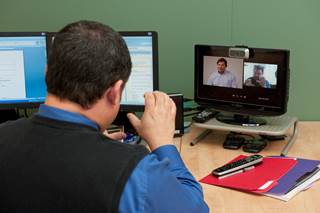 |
|
Smart Phone/Tablet: On a smart phone or a tablet, deaf and hard-of-hearing people can communicate with either a hearing or a deaf person. |
 |
|
Computer: Whether a deaf person has a PC or a Mac, a desktop or a laptop computer, if it has a webcam, she or he can download free software from video relay service (VRS) providers of his or her choice. This enables them to make or receive video relay calls to or from hearing callers in the same manner as above. |
 |
NOTE: Deaf or hard-of-hearing people who use sign language can use these various technologies to call each other directly.
B) Using Voice
Videophone (VP) uses an internet connection with which a deaf individual can use his or her voice to speak directly to the person they are calling. The interpreter signs the hearing person's responses which the deaf person can see on a videophone monitor.
Voice Carry Over is a technology that allows people to speak directly to the person they are calling, then read that person's response on a display on their phone, videophone, tablet or computer.
|
Web-captioned telephone is a web-based service that allows the callers to phone someone and also read real-time, word-for-word transcriptions of their calls on a computer monitor or laptop. It is used by deaf or hard-of-hearing people who prefer using their own voice aided by technology to communicate by phone. |
 |
| Captioned Telephone, such as a Captel phone, has a built-in screen that displays in text everything being said by the other person. |
|
C) Using Text
Online Relay (includes tablets, smart phone. etc.): The online relay service allows deaf or hard-of-hearing people to use a computer or other device to type a text message. When a hearing person is speaking, the operator is typing what he or she says so the deaf or hard-of-hearing person can read it. The relay operator also reads what the person types to the hearing person.
Notetaking
Notetaking is a common accommodation that can be used in a variety of situations such as everyday meetings or last minute meetings in the workplace when an interpreter is not available. Notes can be typed on a computer or laptop, and projected onto a screen, if that technology is available in the meeting room.
 Visual Alerts
Visual Alerts
Visual alerting technology such as a doorbell, smoke alarm, telephone and weather alert signalers all can bring information about sounds that need to be brought to the deaf or hard-of-hearing individual’s attention.
Employer Training
NCCC offers an award-winning workshop that teaches employers valuable information on how to create an accommodating and accessible workplace for deaf and hard-of-hearing employees.
Contact the NTID Co-op and Career Center (585-286-4155 V/VP) to learn more about the Working Together workshop.
The Working Together: Deaf & Hearing People online course is designed to help employers develop the sensitivity and skills to communicate effectively with deaf and hard-of-hearing employees, enable deaf and hearing colleagues to work together more productively, and assist in fostering a workplace culture of diversity and inclusion. It is called Working Together because it is about working relationships. The five self-paced modules in the course will cover topics on Myths and Definitions, Hearing Loss, Deaf Culture, Communication, and Accommodation and Inclusion in the Workplace. This information can benefit employers, co-workers of deaf and hard-of-hearing people, HR business leaders, and other inclusion/diversity professionals.
You can access the “Working Together: Deaf & Hearing People” online course at http://deaftec.org/working-together-online-course.
To inquire about on-site workshops or tailoring training to your organization’s needs, contact the NTID Co-op and Career Center at ntidcoe@rit.edu, by phone 585-286-4155 (V/VP), or by fax at 585-475-7570 or fill out the online form.




